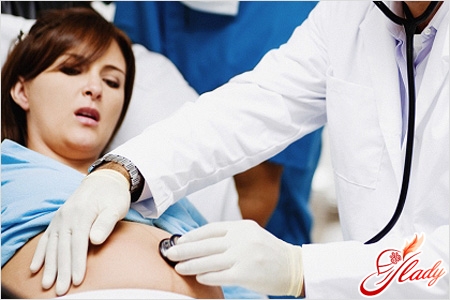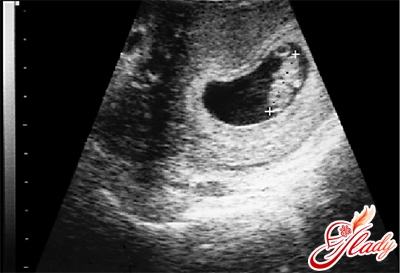 Gynecologists strictly understand thrush asa certain disease that is caused by such a well-known pathogen as a fungus of the genus Candida. Thrush is very often observed during pregnancy. According to medical statistics, approximately 80% of all expectant mothers face this affliction. Thrush does not pose a particular threat to the course of pregnancy, but it can still lead to the development of a number of complications. And a lot of discomfort for the expectant mother is provided. The main symptoms of thrush are:
Gynecologists strictly understand thrush asa certain disease that is caused by such a well-known pathogen as a fungus of the genus Candida. Thrush is very often observed during pregnancy. According to medical statistics, approximately 80% of all expectant mothers face this affliction. Thrush does not pose a particular threat to the course of pregnancy, but it can still lead to the development of a number of complications. And a lot of discomfort for the expectant mother is provided. The main symptoms of thrush are:
- Appearance of abundant discharge from the vagina, having a curd texture and a sour smell.
- Strong itching in the area of the vulva, aggravated after taking a shower and at night.
- The swelling of the external genitalia.
However, it is not only thrush during pregnancycauses burning, itching and discharge. Exactly the same inflammatory symptoms are characteristic of trichomoniasis, gonorrhea, bacterial vaginosis, genital herpes, ureaplasmosis, mycoplasmosis, chlamydia and other infections. Therefore, when the described complaints cause concern, it is necessary to go to a specialist for examination, identifying the pathogen, and in no case to treat yourself, because the choice of drug depends on the exact diagnosis. Like any other infection during pregnancy, candidiasis is dangerous, causing complications during pregnancy and increasing the risk of infection of the fetus. That is why, despite the relatively common occurrence of thrush in pregnant women, this disease is not a harmless and normal companion of pregnancy, as some women believe. Thrush during pregnancy should be diagnosed and measures taken for treatment.
Methods of diagnosis of candidiasis
If there are complaints about discharge, it is necessaryFirst of all, conduct a study such as bacterioscopy, i.e. examining a stained smear under a microscope for flora. Normal vaginal microflora is very important for a woman's health. In a smear, along with epithelial cells and a small number (up to 20) of leukocytes, which are protective cells and, when increased in number, indicate the presence of an infection, lactic acid bacteria (Doderlein's bacilli) should be determined. The diagnosis of candidiasis (true thrush) is made if spores or fungal bodies are found in the smear. However, these fungi can normally be found in the vagina of an absolutely healthy woman, appearing in a smear as single spores, which does not require treatment. Treatment will be required in a situation where complaints appear about white, cheesy discharge with a sour odor, as well as itching that intensifies at night, after sexual intercourse or water procedures. Complaints of this kind are periodic in nature, provoked by hypothermia, starvation, stress or illness outside pregnancy, as well as taking hormonal drugs. As a rule, candidal colpitis or thrush worsens during pregnancy, which is associated with an increase in the level of female sex hormones, leading to a change in the microflora in the vagina and the creation of favorable conditions for the reproduction of fungi. Sometimes the symptoms disappear on their own or after self-treatment, but after a certain period of time they resume. If characteristic symptoms in the form of discharge bother you, and at the same time there are no fungi in the smear, then more sensitive diagnostic methods are used, such as PCR and bacteriological methods. PCR (polymerase chain reaction method) is based on the detection of individual DNA molecules of infectious agents in the material being studied and is the most sensitive method for diagnosing infections, which is very effective in searching for pathogens that are not visible in a regular smear and do not grow well in nutrient media. Using the PCR method to diagnose candidiasis is an unjustified luxury, because the method is quite labor-intensive and expensive, often giving a false positive result, which means positive in the absence of the pathogen. Therefore, the main criterion indicating the need for treatment is specific complaints confirmed by the results of bacterioscopy. However, if thrush is in pregnant women, the doctor may prescribe such a study. The bacteriological or cultural method is seeding on Sabouraud's medium - a special nutrient medium. With this method, individual fungal cells, having found themselves in favorable conditions, even being in small quantities, which is not enough for diagnosis in a smear, begin to multiply, forming a colony and thereby confirming their presence and viability in the material.
Causes of the disease
The causes of persistent candidiasis are:
- Chronic infection, both sexual and any other body system, in which the body's immune system is depleted in the fight against inflammation, which is manifested in the form of candidiasis;
- Chronic diseases, for the same reason;
- Hormonal disorders;
- Admission of hormonal drugs;
- Genital herpes;
- Reception of antibiotics, which cause immunodeficiency, as well as intestinal dysbiosis. The intestine is a reservoir of candidiasis, from which the fungi enter other habitats;
- Malnutrition, leading to the development of dysbiosis;
- Chronic intestinal diseases;
- Incorrect use of eubiotics.
Thus, candidiasis indicatestrouble in the body, and in addition to special treatment with antifungal drugs, a full examination and elimination of the underlying cause of the immune deficiency is required. How to treat thrush during pregnancy? This question worries every second pregnant woman. After all, on the one hand, you should never remain inactive, and on the other hand, taking certain medications is strictly prohibited for women "in position". And treating thrush during pregnancy is simply a must! You don't want a perineal rupture during childbirth, or your baby to become infected, do you? And the union of pregnancy and thrush in most cases leads to exactly this result. Candidiasis is not considered one of those classic sexually transmitted diseases. This is an internal condition caused by a decrease in immunity. That is why, with prolonged and poorly treatable candidiasis, you should look for a pathology in the body that could cause immunodeficiency, manifested by candidiasis. Due to changes in hormonal levels and some other features of the immune system, pregnancy itself is the factor that supports the well-being of fungi. Given these features, it is necessary to conduct timely diagnostics and eliminate serious changes that can carry even the slightest danger to the pregnant woman and the fetus. Candidiasis occurs as an internal condition and can be transmitted sexually, so it is very important that both partners undergo treatment at the same time, using a condom during treatment.
Treating Thrush
Medicines intended for treatmentcandidiasis are divided into systemic and local. Systemic are tablets taken orally, primarily acting in the intestines, and then absorbed into the blood and penetrating all tissues and organs. Compared to local, this method is preferable and basic outside of pregnancy, because first of all, fungi should be eliminated in the intestines, where their main focus is. In addition, fungi in the vagina live in the thickness of the walls, and local drugs act only on the surface, reducing the manifestation of infection, but not eliminating the pathogen, which is the main difference from the action of systemic drugs that act on all cells through the blood. However, due to side effects and toxicity, the use of systemic drugs during pregnancy is limited. During pregnancy, only treatment with ineffective nystatin and pimafucin is possible, which are antifungal drugs chosen during pregnancy and lactation due to their non-toxicity and sufficient effectiveness. Local treatment is creams, vaginal tablets and suppositories. During pregnancy, especially in the early stages, it is necessary to treat in this way. For the treatment of candidiasis, in addition to specific antifungal drugs, anti-inflammatory and antiseptic agents are often used, which have already become folk remedies. These include borax in glycerin and brilliant green. These solutions have no side effects and are chosen to treat candidiasis in the early stages of pregnancy, when taking almost any medication is contraindicated. A gauze swab treated with one of these solutions is used to wipe the walls of the vagina at night. In this way, you can treat thrush for up to 7 days in a row. Fungi live in the intestines and vagina of everyone, and pregnancy only predisposes them to proliferation, but candidiasis does not develop in all pregnant women. In any case, candidiasis is a sign of immunodeficiency, and if it cannot be cured easily and completely, then this indicates a serious chronic pathology, so immunomodulatory and general strengthening drugs are included in the treatment regimen. All medications should be prescribed by the attending physician, based on individual characteristics and the characteristics of the pregnancy. Self-medication is always unfavorable, and during pregnancy it can be dangerous. Only a gynecologist can accurately determine how to treat thrush during pregnancy of a specific patient and, accordingly, prescribe the most optimal treatment using acceptable drugs. When treating a partner, which is mandatory even in the absence of sexual activity, all effective drugs can be used. In conclusion of the topic, let's summarize:
Timely examination and treatment will help preserve the most valuable thing – your health! We recommend reading:









